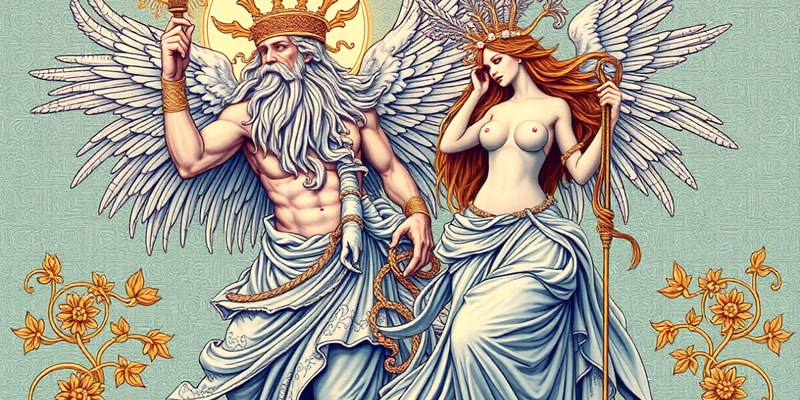Podcast
Questions and Answers
What is the primary role of Zeus Philios?
What is the primary role of Zeus Philios?
Which epithet refers to Demeter as the provider of food?
Which epithet refers to Demeter as the provider of food?
What does the epithet 'Zeus Averter of Flies' signify?
What does the epithet 'Zeus Averter of Flies' signify?
How does the creation of epithets typically present challenges to worshippers?
How does the creation of epithets typically present challenges to worshippers?
Signup and view all the answers
Which epithet is associated with Athena and suggests her role as a warrior?
Which epithet is associated with Athena and suggests her role as a warrior?
Signup and view all the answers
What purpose do epithets serve in the context of worship?
What purpose do epithets serve in the context of worship?
Signup and view all the answers
Which statement about the Olympian Pantheon is accurate?
Which statement about the Olympian Pantheon is accurate?
Signup and view all the answers
Who provided insights about local epithets of gods such as Zeus?
Who provided insights about local epithets of gods such as Zeus?
Signup and view all the answers
What defines a person as a hero according to Ekroth?
What defines a person as a hero according to Ekroth?
Signup and view all the answers
How were heroes worshipped compared to gods?
How were heroes worshipped compared to gods?
Signup and view all the answers
What was the role of family members in the process of hero cults?
What was the role of family members in the process of hero cults?
Signup and view all the answers
What is a characteristic shared by both gods and heroes in terms of worship?
What is a characteristic shared by both gods and heroes in terms of worship?
Signup and view all the answers
Which of the following options reflects a common distinction in the types of gods worshipped?
Which of the following options reflects a common distinction in the types of gods worshipped?
Signup and view all the answers
Which of the following statements about Heracles is incorrect?
Which of the following statements about Heracles is incorrect?
Signup and view all the answers
What percentage of sacrifices in Attica were dedicated to heroes?
What percentage of sacrifices in Attica were dedicated to heroes?
Signup and view all the answers
What term describes the attribution of human characteristics to non-human forms?
What term describes the attribution of human characteristics to non-human forms?
Signup and view all the answers
What was a key feature of the hero Clemoedes of Astypalea's story?
What was a key feature of the hero Clemoedes of Astypalea's story?
Signup and view all the answers
In what context were personal gods like Zeus Philios worshipped?
In what context were personal gods like Zeus Philios worshipped?
Signup and view all the answers
Study Notes
6
Zeus Philios – God of individual and household well-being, prosperity and purification consulted on
issues regarding property, marriage and childbirth
Zeus Herkeios – ‘Zeus of the Fence/Courtyard’ who was a protector of families. Magistrates being
interviewed for a position were asked whether or not they were enrolled in this cult
Epithets for Zeus
Epithets for Athena
Epithets for Demeter
Zeus Xenios, protector of
guests
Zeus Ktesios, guardian of
possessions in a house
Zeus Olympios, overseer of
the Olympic Games
Zeus Horkios, oaths
‘’Zeus Averter of Flies’’ used
by individuals attending the
Olympic and Delphic Games
in Greece who would buy
small figurines of Zeus and
then pray to him in the hope
of killing the flies
Athena Polias, protector of
cities
Athena Parthenos, Athena
the virgin
Athena Nike, granter of
victories
Pallas Athene, morale-
booster
Athena Areia, warlike Athena
Demeter Chthonia, earthly-
one
Demeter Karpophoros, fruit-
bringer
Purpose of Epithets
Addressing a god/referring to a god
Specific to a god
To identify whether worship was local or Panhellenic
To understand how the cult was paid for
To understand the way in which the god was worshipped (goat-eating Hera in Sparta)
Bending of Gods
Creation of Epithets
We have no idea on how or why epithets were created
Pausanias, a Greek travel writer and geographer from the 2nd century AD explains some local epithets
Herodotus tells us that when the Greeks received news of the providential storm that had wrecked much of the
Persian fleet in 480 BC, they prayed and made libations to Poseidon Soter (Saviour) and used this name ever
since
The variety of epithets presented a challenge to worshippers – if a woman was pregnant, which one of the
numerous deities should she pray to? This was incredibly difficult for the Greeks who consulted oracles in order to
understand which god they should worship
A typical approach was to worship groups of deities in order to ‘cover all bases,’ particularly in cases concerning
the rearing and raising of children
Hero Cults
The Olympian Pantheon was not an enclosed entity but rather permeable with various deities joining throughout.
There were unclear boundaries between the gods, demi-gods and mortals
Ekroth defines a hero as being a person who had ‘’lived and died, either in myth or real life, with this being the
main distinction between a god and hero.’’ They had to have achieved something that was unusual for one’s own
lifetime, being either positive or negative
Heracles’ Twelve Labours
Clemoedes of Astpalea had killed his opponent in the pankration at the Olympic Games. When he was
disqualified, in a fit of anger, he ripped down a school roof, leaving sixty children dead and he vanished
from the earth. The Pythia declared him a hero
A hero was worshipped in a way that went far beyond the usual rituals surrounding burial and were worshipped at
their grave site. It was attended by weeping and lamentation
Heroisation was initiated by family members and beneficiaries and became widespread in the Hellenistic Period
Heracles was the most popular hero worshipped – he was honoured at Olympia, where his Twelve Labours were
displayed on the metopes of the Temple of Zeus. Asclepius was worshipped throughout the Greek world and was
perceived as a god but of mortal descent
Heroes and gods were worshipped with rites very similar to each other, with an animal sacrifice at its centre and
the consumption of sacrificial meat
Evidence for Hero Cults
Homeric Epics
Homeric Hymns
Works and Days
Catalogue of Women which explores the relationships between gods and mortals and the heroes that were born
from this
Pausanias
The best preserved sacrificial calendar from Attica showing that of 170 sacrifices, 40% were to heroes and 38% of
these were of budget
Panhellenic, Localised or Personal
Zeus
Personal – Zeus Philios, god of individual and family wellbeing
Local – Zeus Phratrios, protector of Athenian phratries
Panhellenic – Zeus Olympios, Zeus at Olympia (many people from around the ancient world came to compete in
the Olympic Games)
Athena
Athena Chalkioikos, Athena of the Bronze House in Sparta
Athena Pronoia, Athena of Forethought in Delphi
Heracles
Personal – worshipped as a household god. His statue stood in homes to ward off evil
Local – Heracles’ main cult was in Thebes, the place of his birth in mythology
Panhellenic – He was worshipped at the sanctuary of Olympia because of his strength and endurance (by athletes
who competed in the games) and because he was considered to be one of the founders of the games
Some gods and heroes only had local significance. For example, in Erchia, Epops, Leucaspis and Menedeius are three
heroes who are unattested for anywhere else.
Personally, gods and heroes could be worshipped through mystery cults, healing cults or oracular consultation.
Key Term
Definition
Aetiology
The reason or cause for something, often deriving from a
historical or mythical explanation
Agora
The marketplace in a Greek city where economic, political,
social and religious events took place
Anthropomorphic
The attribution of human characteristics and emotions to
non-human forms
Epithet
An adjective or phrase that accompanies one’s name to
denote a quality or characteristic about the individual
Theogony
The genealogy of a group of gods
Zoomorphism
Animal attributes are imposed upon non-animal objects,
humans and gods
Studying That Suits You
Use AI to generate personalized quizzes and flashcards to suit your learning preferences.
Description
Test your knowledge of Greek mythology with this quiz focused on the major deities and their various epithets. Explore the roles and significance of gods like Zeus and Athena in ancient Greek culture. Challenge yourself with questions about their responsibilities and attributes.




